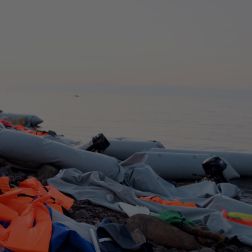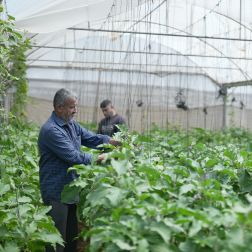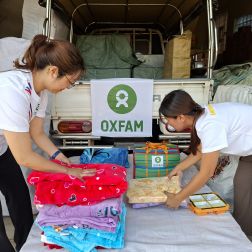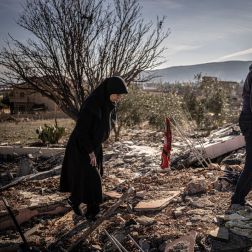
- 4 mins read time
- Published: 11th January 2016
As winter settles in, refugees from Syria face increasing hardship
Hundreds of thousands of refugees escaping the ongoing conflict in Syria face another winter of dreadful conditions in Lebanon and Jordan.

Above, left: A Syrian boy stands in front of his family’s flooded tent in a settlement in Lebanon’s Bekaa Valley. As the first winter storm hit the country, thousands of refugees have little means to face the harsh weather. They urgently need warm blankets, stoves, and fuel. Above-right: Syrian refugees inspect the damage inflicted by the first winter storm to their settlement in Lebanon’s Bekaa Valley. Tents were flooded and the agricultural land on which the camp is set up turned into muddy pools. Photos: Joelle Bassoul/Oxfam
It is nearly 5 years since the start of the conflict in Syria, and an unprecedented human tragedy continues to unfold on an unimaginable scale.
After being forced to flee horrors which they would never have imagined, hundreds of thousands of refugees from Syria have seen another winter descend on the Middle East – for some this is their fifth away from home in increasingly difficult living conditions.
Lebanon’s Bekaa Valley, which hosts the majority of refugees in this small country, is already shrouded in white, while nights in Jordan’s camps are extremely cold with temperatures dropping to zero. Syrian and Palestinian refugees living in camps and improvised shelters are particularly vulnerable to these conditions.

Above: Children in Zaatari – the refugee camp’s transition into a town is presenting huge challenges as the need for infrastructure and access to jobs grows. Photo: Tom White/PA
Asma Qasim, a refugee in Jordan’s sprawling Zaatari camp which hosts about 80,000 people, said: “It’s hard enough to be far from home and our family. I have been living in Zaatari with my husband and three children since 2013. Winter used to be my favourite time of the year until I got here. We can’t sleep most nights because water leaks in and makes everything wet. I am very worried for my children. I think of going back to Syria every day.”
It is not unusual for Zaatari, set in Jordan’s Northern desert area, to witness snowfall, strong winds and freezing rain. Oxfam is helping families to dig drainage channels around their households, to ensure they do not flood.
Oxfam teams are also going door-to-door, informing refugees of ways to keep safe and dry. In case of heavy rains, flooding or snow melt, Oxfam’s Zaatari team has a contingency plan that includes installing additional emergency water tanks, and helping refugees whose homes are damaged to reach communal shelters. We have also mapped flood-prone areas to guide our teams when they reach out to the most vulnerable in the camp.
Outside the camp, we are helping about 1,000 vulnerable families (70% of them refugees, the others Jordanian) by providing relief items such as heaters, gas cylinders, warm blankets and cash to pay for gas refills.
In Lebanon, Oxfam is providing cash transfers through ATM cards to hundreds of Palestinian refugees from Syria. About 450 families will receive a total of US$400 for the winter months in North Lebanon, which will enable them to buy much-needed heating fuel, tools for improving their shelter, and other items, such as blankets, children’s clothing, and stoves. They could also spend this cash on rent, as they all pay to have a roof over their heads.

Above: New lives: Syrian refugee children outside an Oxfam facility in the Zaatari camp, where Oxfam is campaigning for a permanent water and sewage system. Photo: Tom White/PA
In both countries, refugees have seen their resources dwindle as the conflict in Syria drags on. With little or no access to work opportunities, they are forced to rely on humanitarian aid to survive.
The Syria crisis is an unprecedented human and humanitarian tragedy. It is time we ask for accountability from world leaders to take action and solve this together.
If you can, please help by donating to Oxfam Ireland’s Syria Crisis Appeal.
In Jordan Oxfam works in both Zaatari refugee camp and in Jordanian communities that are hosting Syrian refugees. Zaatari camp is now the fourth biggest city in Jordan, housing around 80,000 Syrian refugees. Oxfam currently works in three of Zaatari’s 12 districts, supervising water and sanitation, and also co-ordinating hygiene promotion activities. In addition, together with UNICEF and other international actors, Oxfam is installing a water network in the camp, which will ensure refugees have safe access to water.

Above: Born on the run: baby Sham is just a few hours old, the youngest resident of Zaatari, the Syrian refugee camp in Jordan which has become a semi-permanent city for its residents. Photo: Tom White/PA
To date, Oxfam’s response has included:
- Building 50 water, sanitation and hygiene blocks, including 318 toilets, 288 bathing areas, 72 laundry areas, and 100 water points, serving up to 15,600 people.
- Maintaining 120 water, sanitation and hygiene blocks in 3 districts benefitting around 25,000 people.
- Installing 270 portable latrines as a temporary measure.
- Distributing 75 commodes for disabled users.
- Provided 19 x 95,000 litre and 378 x 2,000 litre water tanks.
- Installed 10 hand-washing facilities in the market area.




